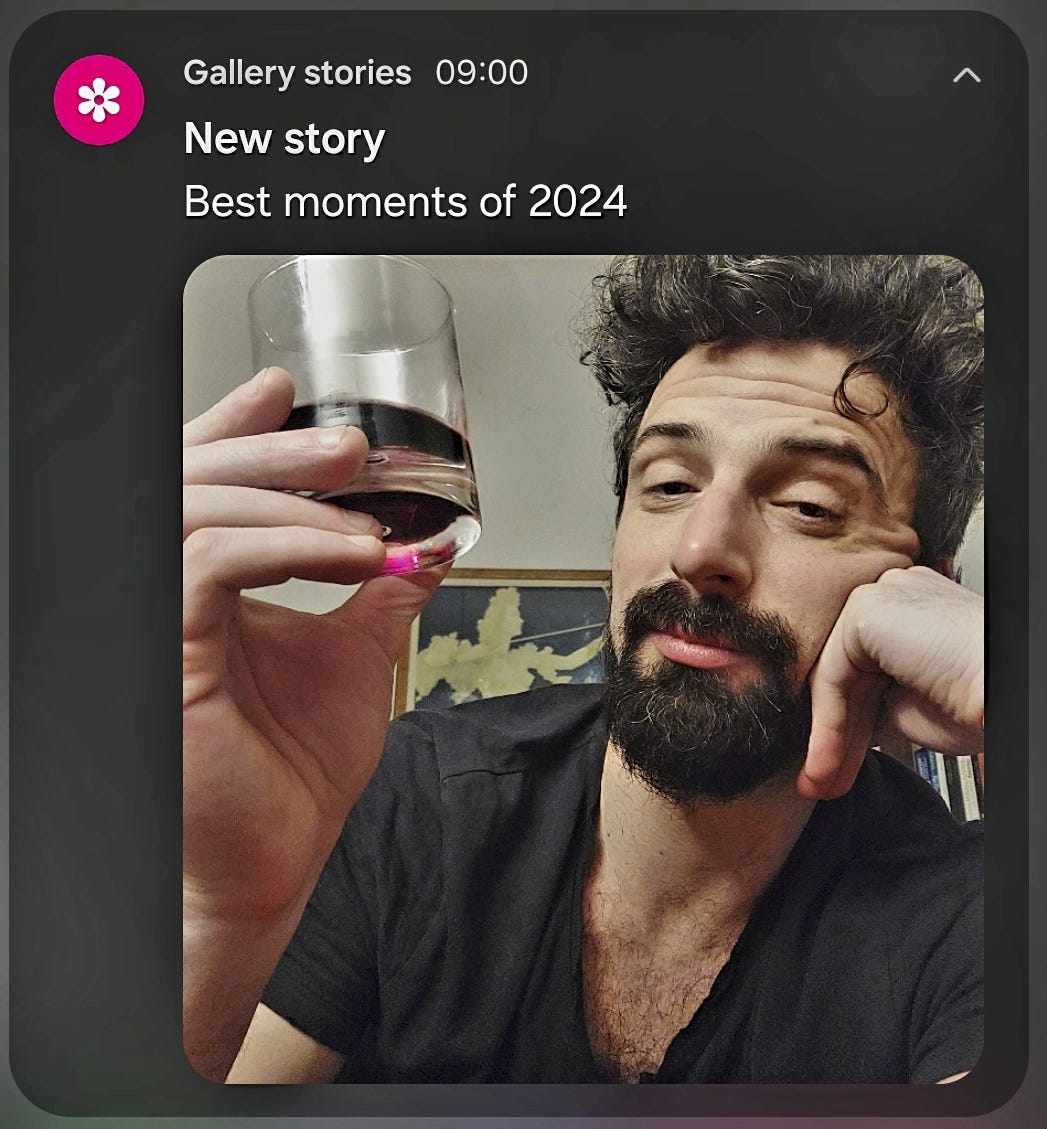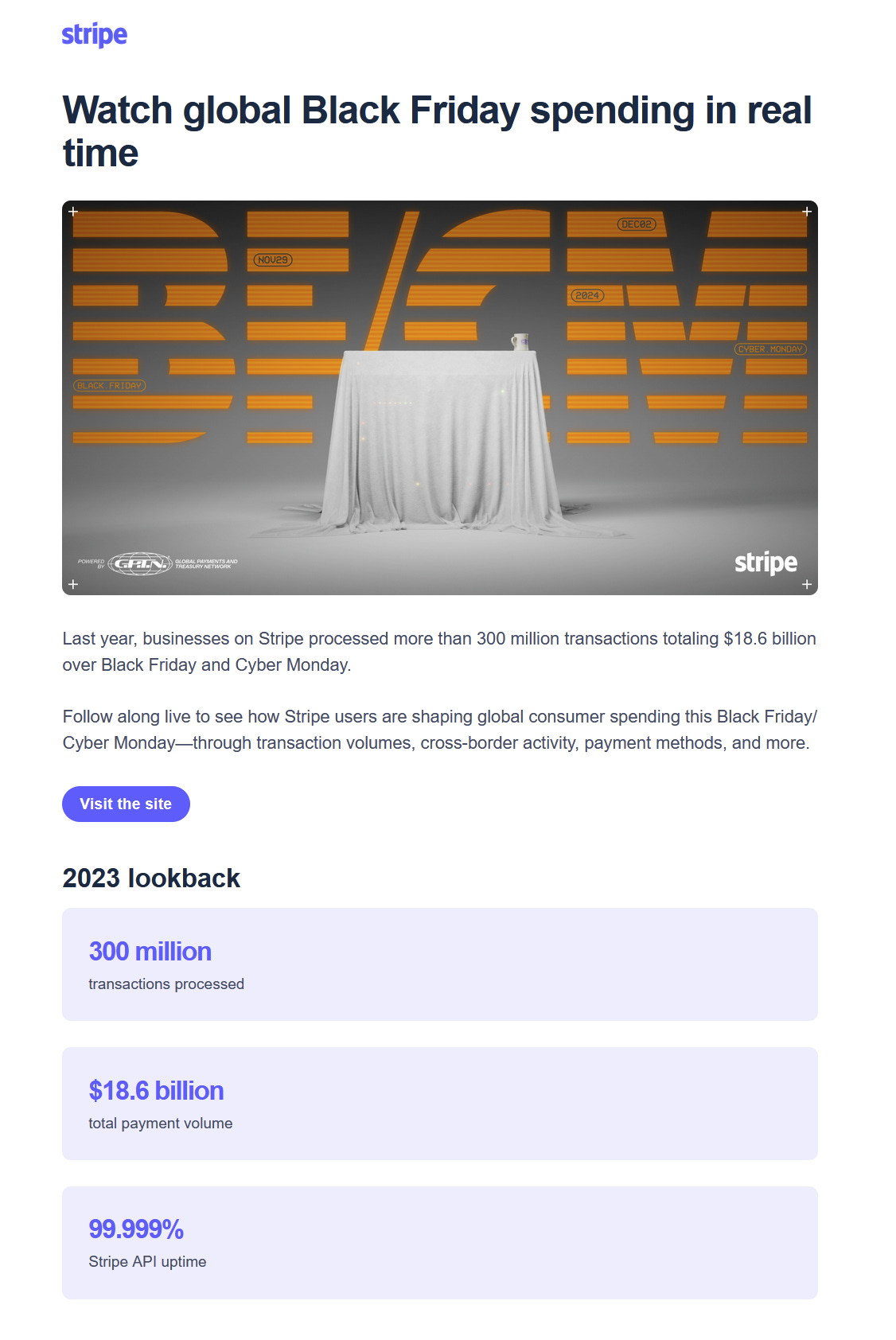Surveillance Capitalism 2024, Wrapped
How spying-as-a-service now gets sent to us as a Christmas present
Paying subscribers can listen to me reading this essay here (19 minutes)
When I was in my early teens, I discovered that I loved birdwatching. I was something of a social outsider, so wilderness spaces became like sanctuaries for me. I would disappear into the forests, mountains and coastal estuaries to search for feathered friends like the starred robin, Narina trogon or buff-spotted flufftail. South Africa has almost 900 species of these birds, so seeking them out in the canopies, thickets and water edges was like playing a long and rewarding real-world game of Pokémon GO (except that birdwatchers don’t try to imprison the birds in a Pokéball).
The most captivating moments for a birdwatcher are hearing the call of a rare bird, or catching a brief glimpse of movement in the undergrowth. Perhaps you follow it and discover small traces of the creature: droppings, footprints, or soil scratched up in the search for grubs. Everything revolves around trying to get an elusive glimpse of it through the binoculars, while excitedly paging through a bird identification book.
When a solid identification happens it can be magical. I still remember the time I finally saw the buff-spotted flufftail, a rare and secretive bird, creeping through a clearing in a small forest…

That was a special moment for me, but what did the moment mean for the flufftail? Well, very little. Through their eyes, I was just some figure hiding behind a tree that they’d tolerate for a while. They might see me scribbling something down in my notebook - when and where I saw them - but that data meant nothing to them. It wasn’t used to alter their environment. It didn’t determine what fruit or grubs appeared before them. It had no bearing on their chances of mating.
In fact, birdwatching has very little impact on birds. It doesn’t change their migration patterns or their sense of themselves. Of course, systematic scientific observation can be turned towards making interventions into their world - from conservation efforts to eradication attempts - but in general, the hundreds of thousands of observations written in the notebooks of countless birdwatchers throughout history stays with the observers alone. There are no debates about who creates or owns the data, because it’s obvious. The birdwatcher creates the data through the act of surveillance, and they own it, and the birds don’t care.
The People-Watchers
Unlike birdwatching, the largest-scale forms of modern people-watching have a very big impact on our lives, and you should care. As you stare at your smartphone or laptop screen, looking at whatever’s on it, there’s a legion of automated observers looking back at you with digital binoculars and recording devices, with trackers sniffing out your cyber footprint, and AI models analyzing the disturbances you leave in the digital record as you scratch around for grubs.
Big Tech companies (or companies using their services) use the data derived from this observation to affect your life, to curate your world, and to steer you down paths you otherwise might have not gone down. They’re not doing passive observation. They’re doing observation with intent to influence, to manipulate, to convince, to induce. This active attempt to affect gets projected back at you via interfaces that look public, but are actually privately targeted at you.
The original Big Tech Faustian bargain goes like this: you’re offered free entry to a digital infrastructure, with little breadcrumbs to entice you in. The companies run at a loss while doing this, long enough to get you accustomed and hooked to a platform. Once dependence sets in for a large enough number of people, the network effects start to ripple out and gently coerce everyone else into becoming dependent too. This is because our economy is an interconnected whole, and it’s wired such that you will be excluded if others are using something that you’re not.
Spotify is a good example of this. It started as a fun and optional service, but as it undermined the alternatives and the network effects kicked in, it started getting oligopoly power. All your friends would start sending you stuff on it, which means you’d get excluded if you hadn’t signed up. Humans are social animals, so exclusion is a serious business that we want to avoid at all costs. That fear of exclusion drives us to a central point: for example, musicians started gearing themselves around the Spotify platform as they realised they would be excluded from listeners if they didn’t.
The end result is predictable. We’ve ended up socially dependent on an oligopoly of streaming music giants. Maybe you can switch from Spotify to Apple Music, but you’re captured no matter what you do. If you’re a lone-wolf outsider type, you can of course channel your inner anarchist hacker and try to live totally outside the system, but for most people that takes energy, and they’re already using most of their energy just trying to survive in their own jobs while looking after family and loved ones.
So, when the smarmy corporate apologists turn up and say that we ‘choose’ to use Microsoft, or Google Search or Spotify playlists, and that we can just as easily leave, they’re being heavily disingenuous and euphemistic. We’re locked in to those platforms, and they’re now basic mandatory infrastructure. And, once a Big Tech player becomes infrastructure, then ‘enshittification’ ensues. This term was coined by Cory Doctorow to describe how the owners of these infrastructures start to squeeze you for profit while degrading their services.
Want to learn more about enshittification and Cory Doctorow, while listening to relaxing music? Check out my new podcast! It also covers Karmic reciprocity, our inner civil war, Mastodon, Bitcoin wrestling and the Mononoke Wolf Choir!
Three ways of selling surveillance-as-a-service
One of the primary methods for squeezing profit is through spying on users, but historically people get weird about being spied on. So, to engineer consent for this, the platforms started spinning surveillance as a service for your own good.
The first wave of this was cringe. Remember when all those internet companies started saying they collected data to ‘improve your ad experience’, as if they were helpful attendants doing their best to find you ‘relevant ads’? Well, the ‘irrelevant ad’ or the ‘bad ad experience’ really wasn’t a problem for you, but it was a problem for advertisers. What the tech companies were really saying to you was ‘our advertisers want us to find the people who are most likely to be influenced by their messaging’.
Deep down everyone knows that receiving advertising isn’t a ‘service’, but a more advanced way of selling you on surveillance was to present it as something that gave a personal touch to your experience of an otherwise inhuman infrastructure. You might be one tiny account among billions in Amazon’s vast servers, but they’d reflect your data back at you via personal pronouns like ‘my’ - My Amazon - as if you were in your own personal shop. When combined with AI ‘chatbots’ - automated answering machines constructed from your data, which speak in the first person as ‘I’ - it’s as if you had a personal assistant in your personal shop. For more on that see:
These first two waves of consent-engineering justified surveillance as useful while disguising it in personalised terms. The newest phase, however, is to brand this personalised surveillance as something fun, interactive and social. The idea is to offer a person snapshots of their own surveillance, bundled together - or wrapped - with commentary.
Spotify is a pioneer in this. Their Spotify Wrapped is a yearly ‘wrap-up’ of your most listened songs and favourite genres. They gamify it with achievements and special persona badges that you might unlock through your behaviour. Oh, you’re The Adventurer.
Spotify Wrapped got pushed at me hard via the app last year, and I made the mistake of clicking on it. An interactive spectacle unfolded on my phone that was both interesting and creepy. Supposedly I share tastes with people in Asheville, North Carolina. They even had a morose video message from Alt-J - apparently my most listened-to band - who’d been roped by Spotify into recording a thank-you for their fans.
Spotify Wrapped was like a curated exhibition of their observations of my life. It was as if I were a buff-spotted flufftail that had walked into a clearing and found that a zealous birdwatcher had rigged up a curated showcase of my year for me to observe. Here’s a video of you eating a caterpillar.
You can alter the metaphor to suit your tastes, but the basic gist is this: rather than hiding their data extraction, they push it at us, like a CIA agent mailing some photocopied highlights from their log-book to their targets, along with a message that says ‘your year in review!’
Of course, if a CIA agent actually did that, it might spook you and make you self-conscious. That’s what happened to me with Spotify Wrapped. The observation comes from an external watcher who is trying to appear familiar by using second-person pronouns like ‘you’ and ‘your’ (‘Your year’, ‘you are…’), so I suddenly started thinking of myself through second-person eyes: If I listen to this meditation music as a backdrop to working, will it show up in my most-listened songs, and what will that say about me? I’m really more of a rock and psychedelic folk person.
Of course, if you become accustomed to these annual surveillance exhibitions, there’s the possibility that you start to change your behaviour in anticipation of their presentation back at you. That taps into an older trend from platforms like Facebook and Instagram, where people’s lives start to reflect what images they want projected out, rather than the images reflecting what people’s lives actually are. Spotify Wrapped is becoming more like this, precisely because it’s also designed to be social - you can share your surveillance package with others.
The social element is important, because the ultimate victory for these platforms will be to normalise surveillance capitalism as something we not only expect, but look forward to, and even demand, and making it social can solidify that. The ideal for them is for your family and friends to start requesting your Wrapped self - show me what the CIA agent sent! - and for you to experience rewards, pride and praise for that. The goal for all corporates is to become an unquestioned part of our cultural fabric, something that friends, family, media and political leaders push you into regardless of whether you want it, like eating Kentucky Fried Chicken as a tradition on Christmas day in Japan, the result of a 1974 ad campaign by the corporation.
The Wrapping Revolution unfolds
Corporate bosses are herd animals. They see one company doing something and they all follow. So, while Spotify was among the pioneers of ‘wrapping’, every company with user data now tries to do some version of it. For example, my phone provider GiffGaff is - like many UK companies - an egregious pusher of ‘wackaging’: wacky, infantilizing packaging designed to present themselves not as a legal entity that optimizes shareholder profit, but as my chummy friend, like a guy at the pub. So here’s my friend at the pub presenting me with a list of heart-warming things they’ve noted down about me during the year.
I get the sense that I’m supposed to say ‘thanks’ for this automated simulacrum of friendship, but they’re not alone. All the companies are there trying to paw off their disingenuous scrapbooks of memories at you. Even my phone photo gallery does it: last week I got a notification about my ‘best moments’ in 2024, headlined by an image of me drinking red wine alone in my lounge. Look at this nice thing we did for you my friend. It’s a testament to… our relationship.
This ‘relationship’ is non-existent, because to Samsung or Android I’m just one node, constructed from ones and zeroes, among billions of others, each with data attached to them. Some of these companies, though, are now talking about the relationship they have with those billions, with society, the world. They approach us as a whole and tell us to look at our 2024 Wrapped.
The pioneer in this is Google Trends, which now presents a giant global wrap-up of what the world, and entire regions searched for. The individual countries can even get social about it - ha ha, look at you Kenya, searching for chicken curry recipes while India searched for porn star Martinis. Google released a YouTube video about the 2024 trends 10 days ago. It currently has 200 million views, with people in the comments getting all weepy about how the epic scale surveillance now allows society to experience itself as a collective.
As much as I’d like to get caught up in the euphoria of that, I’d like to note that this actually falls under the broader category of cultural hegemony, the process by which powerful interest groups - like Google - create the illusion that their narrow interests are the broader interests of society as a whole: they are on the same side as us, a collaborator with the public in the great adventure of life, merely helping us along and reflecting what we want. They will make presentations to this effect: look what you all did. I was there with you. We were there together.
The other corporate bosses, naturally, follow suit. The global payments processor, Stripe, for example, emailed me in November telling me that I could watch the global extravaganza of Black Friday payments in real time, as if ‘consumer spending’ was a new live-streamed sport.
You’ve probably noticed by now that corporate marketing teams have turned Black Friday into a whole week, but this was never decided by ‘us’, or by ‘society’. It was engineered through the process of ‘interpellation’, which is a very useful concept developed by Louis Althusser. In simple terms, if a person is addressed as if they already are something, or already believe in something, it pushes them towards being that thing and believing that thing. In There is no Black Friday, I showed how this was used to create the non-existent ‘day’, Cyber Monday:
Cyber Monday was written into existence by a press release from the National Retail Federation (the biggest retail trade association in the world), which said: ‘Cyber Monday Quickly Becoming One of the Biggest Online Shopping Days of the Year’.
All the subsequent commercial slogans, like ‘Cyber Monday is Here’, and ‘Are you ready for Cyber Monday?’, speak at you as if you’re already a person who agrees this thing is a reality. This generates a feeling of a movement, of a whole mass of people somewhere - presumably - who already know about this thing that you’re only catching onto now.
Corporations know that the secret to good interpellation is to phrase stuff as if they’re responding to a request, because in doing this they address you as someone who has asked for something. I pay Spotify, and my phone company, but I’ve never asked for their ‘wrapped’ review packages, and yet over the last years they’ve started turning up with messages like ‘Here is Your Year in 2024’. I am being spoken at like someone who has opened the door for a deliveryman who says ‘I have your package’. This carries that embedded message of you asked for this and we delivered. The interpellated payload is clear: you want your own surveillance. You expect it. We did this for you.
The flufftail in captivity
This process of getting us to expect and call for our own surveillance is a process of domestication. It’s like getting that buff-spotted flufftail to enter an enclosure and become like a domesticated chicken that waits to be fed (or, like enticing a Pokémon into a Pokéball).
Of course, actual birdwatchers aren’t interested in watching chickens. There’s no point taking your binoculars and notebook to record chicken sightings, because the behaviour of the chicken is constrained and steered by chicken farmers who shape the data by shaping the world of those birds.
So, when Big Tech companies, and corporations in general, cultivate a domesticated population that responds to whatever cues are given them, surely the data is polluted by the fact that we’re no longer ‘in the wild’. In fact, the ‘wrapped’ snapshots of us are increasingly taken in captivity, which means they do not necessarily reflect our will - or the ‘will of the people’ in the case of collectives. After all, do you really think that what we searched for on Google was unaffected by algorithmically curated feeds? Was it really driven purely by independent thought rather than the artificial herd behaviour induced by social media platforms with profit motives? Yeah. Trends might roughly represent The Collective Consciousness, but it’s not a consciousness solely of our own making.
So here’s the final wrap about our, and your, 2024 in data extraction. Your inner buff-spotted flufftail is being flushed out of the woods, and you are being wrapped in paternalistic cling-film, like a Christmas turkey in a supermarket. Share that with your friends and family. Make it social.













It's fucking creepy but also revealing. Signed, wannabe anarchist hacker hiding in hollow log deep in the forest
Brett, this is another spotlight on the reality of our lives that lurks in the shadows of today's world. Excellent! Let us always remember that mega-corporations in every sphere have one overarching motive: to control us and exploit us for the benefit of a few.